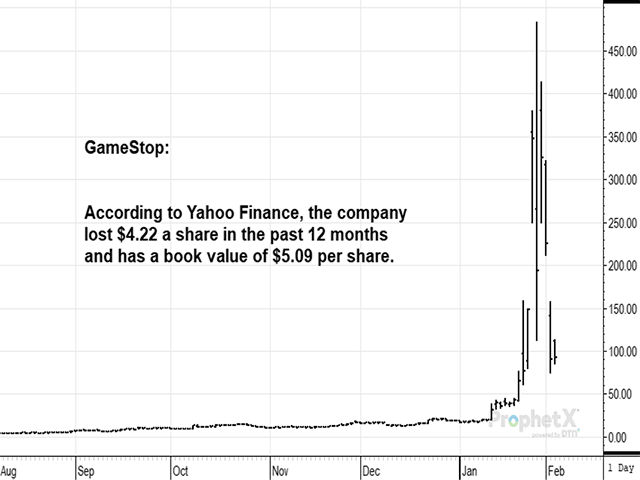Todd's Take
Where the Games Never Stop!
Those that know me well will tell you that I live under a rock when it comes to keeping up with cultural events, but even I couldn't help but notice the brouhaha surrounding GameStop the past several weeks. In case you somehow missed out, Wikipedia describes GameStop as the "world's largest video game retailer," based in Grapevine, Texas. Your kids or grandkids can tell you more.
The brief story is that the company has not been doing so well lately, and hedge funds flew in and sold the stock short, hoping to profit from a decline in the price of the stock. Fundamentally speaking, the hedge funds weren't necessarily wrong. According to Yahoo Finance, GameStop lost $4.22 a share the past 12 months and, like a lot of retail businesses, is struggling against online competition.
The interesting twist here is that discussion groups formed on the internet and apparently convinced many to buy shares in GameStop, forcing the shorts to run for cover. The most notable chat group is Wallstreetbets on Reddit.
In the process, the price of GameStop went from $17.25 per share at the start of the year to a peak of $483 by Jan. 28. That is 28 times the starting price in less than a month. This flash in the pan fell back to $53.50 on Thursday's close (Feb. 4), leaving many breathless as to what just happened with billions of dollars quickly made and lost.
As usual, DTN Contributing Analyst Elaine Kub had interesting and well-thought-out comments on DTN Wednesday (see "Could the Robinhood Retail Revolution Come for Ag Commodities?" at https://www.dtnpf.com/…).
P[L1] D[0x0] M[300x250] OOP[F] ADUNIT[] T[]
I agree with Kub that the leveraged nature of the futures market and the aspect of having to face physical deliveries are difficult hurdles for wannabe manipulators to mess with ag commodities the same way they did with GameStop. As Kub also pointed out, ag markets have had enough of their own versions of short squeezes.
While the GameStop experience is still fresh, I can't help but see another lesson for ag markets that deserves attention. For anyone trained in the vocabulary of supply and demand we learned in school, we need to update the way we look at markets. That includes market analysts, risk managers, government officials -- all of us. The old assumptions that market participants are rational and markets are efficient and somewhat predictable aren't holding up in the real world.
Please don't misunderstand: Supply and demand curves have their place. But, again, I make the point: Markets are people and people are emotional. People are also mischievous and at times malicious. There is good reason casinos spend money on security.
As an analyst, I can show you statistically that actual prices have very little correlation to USDA's ending stocks-to-use ratios -- the bedrock of fundamental analysis. Part of that is because USDA's estimates aren't perfect, but the larger part is because market behavior is more erratic than many realize. Sometimes, that behavior is just plain nuts.
Because of the low correlation of prices to fundamentals and because of the uncertainty of life, it is extremely difficult for any farmer or rancher to confidently know where the price of his crops or livestock are going to land on a future date. For many, I'm not saying anything new, but how many still strain over the fundamentals and bet the farm on where they think prices are headed?
I came across an interesting quote in an article by Dan Caplinger on The Motley Fool (see https://www.fool.com/…). According to Caplinger, Warren Buffett once said, "I had a harrowing experience shorting a stock in 1954. I wouldn't have been wrong over 10 years, but I was very wrong after 10 weeks, which was the relevant period. My net worth was evaporating."
I contend that you don't have to be a short seller to be punished by the market's insane behavior. Farmers and ranchers can tell you about a lifetime of prices below production costs while we were all busy feeding our bellies.
Buffett and his partner, Charlie Munger, frequently talk about the market's irrational behavior, and that should be enough to make us pause.
For farmers and ranchers trying to make a living by putting food on our tables, it can be extremely frustrating to deal with all the crazy behavior the market throws at us. Sometimes markets make sense, but often they don't, and the unexpected turns can be expensive detours for producers expecting rational outcomes.
Currently, corn and soybean prices are historically high and appear to be well-supported by tight supplies. It is difficult to see the return of large surpluses anytime soon -- that is the reasonable fundamental outlook. Who else was depending on a reasonable fundamental outlook in January? Oh yeah, the hedge funds that were short GameStop.
Todd Hultman can be reached at Todd.Hultman@dtn.com
Follow him on Twitter @ToddHultman1
(c) Copyright 2021 DTN, LLC. All rights reserved.




